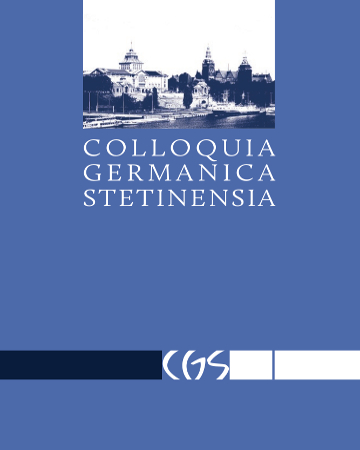







| Authors: |
Daniel
Rothenbühler
Hochschule der Künste Bern |
| Keywords: | Moravia Switzerland migration visual arts “decade of women” experimental writing radio play “overwritings” |
| Data publikacji całości: | 2023-11 |
| Page range: | 20 (5-24) |
| Downloads ?: | 129 |
| 1. | Bigler, Regula. Aufgezeichnete Erinnerungen. Schriftinszenierungen im Spätwerk Erica Pedrettis. Würzburg: Königshausen & Neumann, 2020. |
| 2. | Haupt, Sabine. „‚Plurale Identität‘. Erica Pedretti im Kontext der (sogenannten) ‚Schweizer Literatur‘“. In: Die Erinnerungstexte der Autorin Erica Pedretti, hrsg. v. Meike Penkwitt, 143–158. Würzburg: Königshausen & Neumann, 2012. |
| 3. | Kamm, Martina, Bettina Spoerri, Daniel Rothenbühler, Gianni D’Amato. Diskurse in die Weite. Kosmopolitische Räume in den Literaturen der Schweiz. Zürich: Seismo, 2010. |
| 4. | Kondrič Horvat, Vesna. „Schreiben – Ort der Sicherung in einer von Fragen und Zweifeln durchdrungenen Zeit. Zu Erica Pedretti. In: Die Schweiz ist nicht die Schweiz. Studien zur kulturellen Identität einer Nation, hrsg.v. Marek Hałub, Dariusz Komorowski, Ulrich Stadler, 125–137. Wrocław: Wydawnictwo Uniwersytetu Wrocławskiego, 2004. |
| 5. | Kondrič Horvat, Vesna. „Der ,dritte Raum‘ in Erica Pedrettis Roman ‚Engste Heimat‘“. In: Primerjalna književnost 30 (2007) 2: 37–51. |
| 6. | Kondrič Horvat, Vesna. Nur das Unausgesprochene bleibt genau das, was es mir bedeutet. Studien zu Erica Pedrettis Prosa. Berlin: Weidler, 2020. |
| 7. | Matt, Beatrice von. „Der Aufbruch der Frauen (1970–2000)“. In: Schweizer Literaturgeschichte, hrsg. v. Peter Rusterholz, Andreas Solbach, 400–434. Stuttgart, Weimar: Verlag J. B. Metzler, 2007. |
| 8. | Pedretti, Erica. Engste Heimat. Roman. Frankfurt a. M.: Suhrkamp, 1995. |
| 9. | Pedretti, Erica. fremd genug. Berlin: Insel Verlag, 2010. |
| 10. | Pedretti, Erica. Harmloses, bitte [1970]. Frankfurt a. M.: Suhrkamp Taschenbuch, 1979. |
| 11. | Pedretti, Erica. Heiliger Sebastian. Roman. Frankfurt a. M.: Suhrkamp, 1973. |
| 12. | Pedretti, Erica. Heute. Ein Tagebuch. Frankfurt a. M.: Suhrkamp Taschenbuch, 2001. |
| 13. | Pedretti, Erica. Kuckuckskind oder Was ich ihr unbedingt noch sagen wollte. Roman. Frankfurt a. M.: Suhrkamp, 1998. |
| 14. | Pedretti, Erica. „Schauen / Schreiben. Wie kommt das Bild zur Sprache / Wie wird Sprache bildhaft?“ [1996]. In: Die Erinnerungstexte der Autorin Erica Pedretti, hrsg. v. Meike Penkwitt, 279–287. Würzburg: Königshausen & Neumann, 2012. |
| 15. | Pedretti, Erica. Sonnenaufgänge, Sonnenuntergänge. Erzählungen. Frankfurt a. M.: Suhrkamp, 1984. |
| 16. | Pedretti, Erica. Valerie oder Das unerzogene Auge. Frankfurt a. M.: Suhrkamp, 1986. |
| 17. | Pedretti, Erica. Veränderung oder Die Zertrümmerung von dem Kind Karl und anderen Personen. Frankfurt a. M.: Suhrkamp, 1977. |
| 18. | Penkwitt, Meike (Hg.). Die Erinnerungstexte der Autorin Erica Pedretti. Würzburg: Königshausen & Neumann, 2012. |
| 19. | Penkwitt, Meike. Erica Pedretti. Kontrapunktik, Räumlichkeit und Materialität der Sprache als Prinzipien der Textorganisation. Würzburg: Könighausen & Neumann, 2013. |
| 20. | Sandnes, Guro. „Schreiben zwischen zwei Welten. Zu Erica Pedrettis Harmloses, bitte & Engste Heimat“. Masterarbeit an der Universität Bergen, Institut für Fremdsprachen, 2009. Zugriff 28.04.2023. https://bora.uib.no/bora-xmlui/bitstream/handle/1956/4999/57679451.pdf?sequence=1&isAllowed=y. |
| 21. | Šebestová, Irena. Die Fremde in der Fremde. Zur künstlerischen Identität im Schaffen von Erica Pedretti. Frankfurt a. M. u.a.: Peter Lang, 2008. |
| 22. | Weber, Paul. Das Deutschschweizer Hörspiel 1925–1990. Zugriff 28.04.2023. https://www.hoerspiel-ch.lima-city.de/index.htm. |
| 23. | Weidermann, Volker. Max Frisch. Sein Leben, seine Bücher. Köln: Kiepenheuer & Witsch, 2010. |
| 24. | Würffel, Bodo. Das deutsche Hörspiel. Stuttgart: Metzler, 1978. |